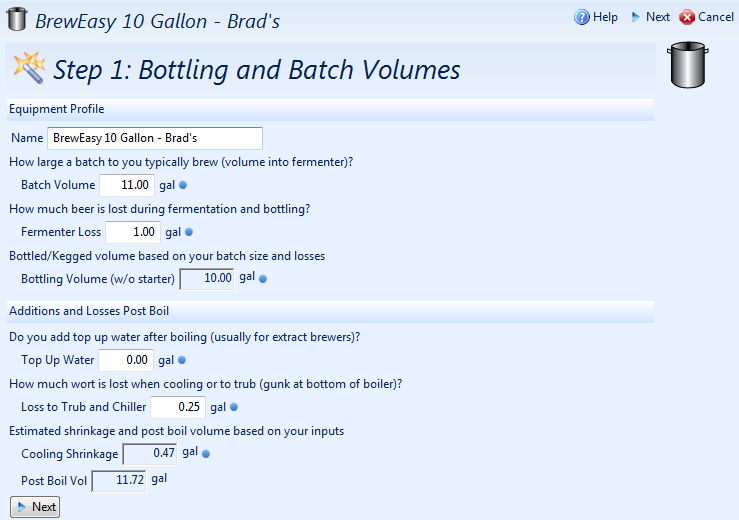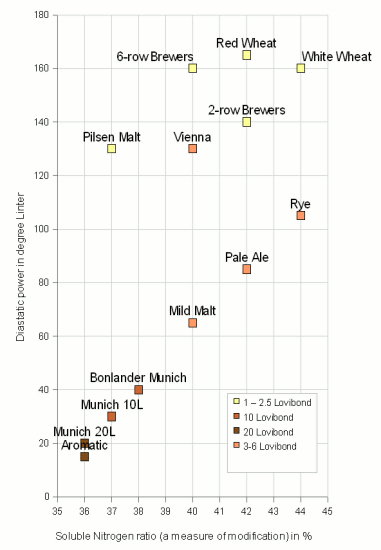
- Beersmith grain absorption how to#
- Beersmith grain absorption full#
- Beersmith grain absorption free#
We’re partial to this Simple BIAB Calculator that takes a minimal amount of variables (Grain, Hops, Boil Duration, Boil-off rate, Finished Beer Volume, Fermentation trub, Kettle Diameter, Mash Temp, Grain Temp) and gives you a total volume of water and a strike temperature.


Brewgr is a homebrew community where you can tap into the bounty of tried, true, and tested homebrew recipes that exist in the arsenal of homebrewers everywhere. (4.5 kg) of grain, the calculated strike water volume is 12.5 quarts (11.8 liters). I really like this tool, and I have a bit of feedback.

So, with an expected mash efficiency of 75%, you get: 0.916 x 0.75 = 0.687 or 68.7% Brewhouse Efficiency. The calculator should be able to adjust how much grain and water you need. However, you then multiply that by your expected mash efficiency to get your actual BE. The goal was to build something that provides a simple and intuitive user interface yet implements the underlying chemistry to at a level of accuracy that is generally not done in brewing water calculators. Calculate equations, inequatlities, line equation and system of equations step-by-step. Compared to a typical three-vessel homebrew day, expect to save about 2 to 2.5 hours when you BIAB! Mash-in, stir to reach mash temp, set timer for 60 minutes.
Beersmith grain absorption how to#
I plan on putting together an article on how to calculate salt additions, but until then, please reference this article. 1.84 (2): Added a Hops Scheduler, and I now save your metric/US preference If you want to print the results, I found that you have to use print screen to do it. I put my specifics into the Simple BIAB calculator and got what seemed to be some odd numbers. 1.85 (0): Updated calculator links in the BIAB checklists, and put them on the top of the page. Assume a 60% efficiency as a base, unless you have a number to use from a previous brew day. This spreadsheet has an anytime gravity estimate and correction calculator to help … A successful brew day always starts with a great plan. These include SS brewtech, Clawhammer, Brew-Boss, High Gravity, and many others. Homework Check: Our algebra calculator can help you check your homework. This is a simplified version of the online calculator. Brewer's Friend is a complete homebrew beer recipe designer with brewing calculators, brew day planner, journal & more. It's just an alternate method for all-grain brewing. Therefore the formula for calculating the strike water volume is: Strike water volume = weight of grain * desired mash thickness.
Beersmith grain absorption free#
Simple Calculator - Free Online Calculator. If you DO squeeze the grain bag, change the Grain Absorption value to around 0.031 Gal/Pound (0.28 L/kg) So, to bottling beer: 1. In fact the only calculator that goes to that extent is A.J deLange’s NUBWS (Nearly Universal Brewing Water Spreadsheet). Change the 15 minute to 5 minutes and move the flameout (0mins) to the cube.
Beersmith grain absorption full#
So to make it simple and avoid the inevitable ruined bottles, I thought I’d explain, in full (with lots of pictures! This calculator would not be possible if not for the great discussions at HomebrewTalk, R/Homebrewing, Biabrewer forums, and the BIAB Calculator & Converter Get step-by-step solutions from expert tutors as fast as 15-30 minutes. Pour in your 2.4 gallons of boiling water at the end of your 60 minute mash. Examples: steep specialty grains at 168F for 20 minutes, Ferment at 68F for 14 days, etc. 1.0m members in the Homebrewing community. However, given the frequency with which I brew and the fact I regularly mill enough grains for 10+ gallons of beer, I began searching for a heftier option and eventually settled on the Monster Mill MM3, a 3-roller rig that has so far impressed the hell out of me. Because of the simplicity of the process and equipment, BIAB has become a popular means of all-grain brewing for homebrewers new to mashing, living in small confines, pinching pennies, or brewing small batches.


 0 kommentar(er)
0 kommentar(er)
